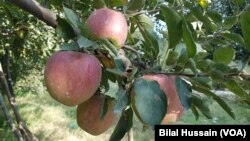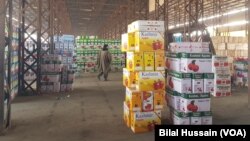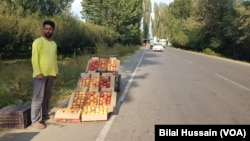Kashmiri apple growers are demanding that the Indian government take strong action to stop the alleged illicit movement of Iranian apples through Afghanistan to markets in India, saying the practice is depressing prices and undermining a $150 million (12 billion Indian rupees) in annual regional industry.
The growers say there is evidence that the Iranian apples are being shipped through Afghanistan so they can be imported into India duty free under the terms of the eight-country South Asian Free Trade Area. Iran is not a party to the agreement.
"We don't want a ban on Iranian apples. Rather we want that they should be imported to India through legal means by paying the import duty. After paying proper taxes, it will no longer be cheaper any more in Indian market," said Mir Mohammad Amin, a grower and trader from South Kashmir's Shopian district.
Kashmir's cool climate makes it a favored region for growing fruit and nuts, some 2.6 million tons of which are shipped annually to more than 150 markets across India as well as overseas. The apple industry alone is an important source of livelihood for 3.5 million people in Indian-administered Kashmir.
But a large share of this year's bumper crop is sitting unsold in cold storage sites, the result of a combination of unusual transport problems and, the Kashmiri growers say, unfair competition from Iran.
"We still have lot of apple produce in our godowns and [climate controlled] stores that will get a hit because of the import of Iranian apples to various coastal states of India," said Bashir Ahmad Bashir, chairman of the Kashmir Valley Fruit Growers/Dealers Union.
He said the price of a box of high-quality apples this year is between $6 and $7.50 (INR 500-600), down from between $11 to $13.50 (INR 900-1,100) a year ago.
Digvijay Gupta, joint director of the Jammu and Kashmir Horticulture, Planning and Marketing Department, suggested the growers are overstating the problem. He cited statistics showing just 40,000 metric tons of Iranian apples are reaching Indian markets, compared to 300,000 metric tons of apples from Kashmir.
But the Kashmiri apple growers believe the volume of Iranian apples has grown significantly in recent years and is considerably larger than the official figures indicate.
They also note that their concerns are shared by apple growers in the neighboring Indian states of Himachal and Uttarakhand. At a meeting of the Apple Farmers Federation of India this week, growers from all three states agreed to organize a protest in New Delhi on March 6.
The Kashmiri apple growers' problems have been compounded this year by maintenance and repair work on the main highway connecting the Kashmir Valley with central India during September and October, critical months for shipping their produce to market.
Fayaz Ahmad Malik, president of the fruit growers and dealers association, Fruit Mandi Sopore, said the roadwork had caused lengthy delays, allowing apples and other perishable fruit to decay on the trucks. He estimated the loss to growers at about $18.5 million (INR 1.5 billion).
Mehbooba Mufti, who served as chief minister of Jammu and Kashmir until 2018, joined a group of fruit farmers protesting the road closure in September.
"You have turned Kashmir into an open jail, pulverized our economy," she said in remarks aimed at the federal government. "I warn the administration if they don't immediately open the roads for trucks, I along with our workers will sit in a protest."
In response to the public outcry, the traffic police insisted that they had not held up any trucks for longer than two days and threatened to arrest anyone circulating false rumors.
"Over 10,000 [heavy motor vehicles], including 8,820 fruit-laden trucks, released through Navyug and Jawahar tunnels during the past 24 hours," Jammu and Kashmir's Information Department tweeted.







